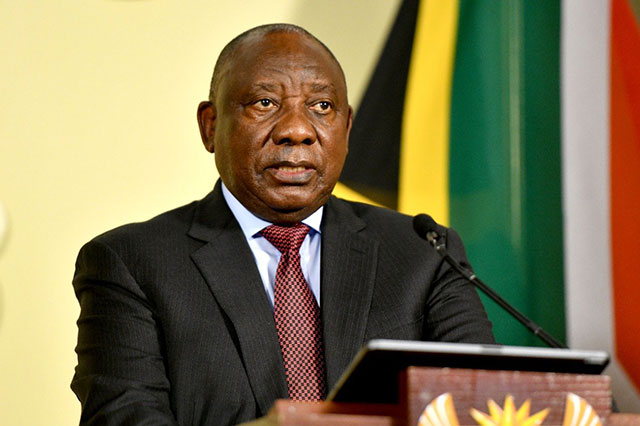Johannesburg – South African President Cyril Ramaphosa is embroiled in a scandal over an alleged cover-up that has imperilled his political future.
Here’s a factfile on the case:
What is this about?
A complaint filed in June accused Ramaphosa of having attempted to conceal the theft of a cash haul at his farm.
It alleged he arranged for the burglars to be kidnapped and bribed into silence when he should have reported the robbery to police.
Following an outcry by a tiny opposition party, parliament empowered an independent panel to investigate the affair.
The probe has concluded Ramaphosa may have committed serious violations and misconduct.
Parliament is discussing the report on Tuesday – a debate that potentially opens the way to a vote to remove Ramaphosa from office.
Who filed the complaint?
The allegations were first made by South Africa’s ex-spy boss, Arthur Fraser, an ally of Ramaphosa’s predecessor and political rival Jacob Zuma.
After Zuma was jailed last year, it was Fraser, who had by then been appointed head of the prison service, who controversially granted him release on medical parole.
The burglary
Ramaphosa told the investigators that $580 000 in cash was stolen from his Phala Phala ranch in northeastern South Africa in February 2020.
At the time, he was attending an African Union (AU) summit in Addis Ababa, Ethiopia.
He said the sum was payment for buffaloes bought by a Sudanese citizen who had visited the farm on Christmas Day, 2019.
Initially stored in a safe, the cash was later hidden beneath sofa cushions in his residence at the ranch – a place staff believed to be the “safest,” he said.
The amount of money involved has been disputed by, among others, the panel which says it could have been around $800 000. Fraser, in his complaint, said it was more than $4 million.
The buyer
Little was initially known about Hazim Mustafa, who bought the buffaloes from Ramaphosa, other than that he was said to have paid a large sum in cash for 20 animals that the president admitted in his submissions to be “substandard” and a “financial drain” on the ranch.
More than two years after paying for the buffaloes, Mustafa had yet to take possession of the animals, the inquiry noted.
But in interviews with British media this month, Mustafa, who lives in Dubai, confirmed the transaction and said he did not know the buffaloes belonged to Ramaphosa when he bought them.
The animals have not yet been delivered to him because of delays triggered by the coronavirus pandemic, and he has been waiting for a refund, he said.
What does the report say?
The panel’s report raised questions about the source of the money and Ramaphosa’s conduct, and said the evidence warranted further scrutiny by parliament.
“There is a substantial doubt about the legitimacy of the source of the currency that was stolen,” it said.
It also said Ramaphosa “may have committed” serious violations and misconduct in not reporting the theft directly to police and in seeking the help of his Namibian counterpart to apprehend the thieves.
The president reported the robbery to the head of his presidential protection unit, General Walther Rhoode, who in turn failed to adequately pass the information onto police, the investigators said.
Ramaphosa’s accusers say the president tasked Rhoode with investigating the matter directly.
What has Ramaphosa said?
The allegations strike at the heart of the image that Ramaphosa has sought to a project as a clean-hands president after Zuma’s corruption-drenched era.
Shortly after Fraser filed his complaint in June, Ramaphosa described the allegations against him as politically motivated.
In his lengthy submission to the investigators, he denied any wrongdoing, singling out in particular allegations that he had had the burglars kidnapped.
“I did not ‘hunt’ for the perpetrators of the theft… nor did I give any instructions for this to take place,” he wrote, describing charges against him as “without any merit.”
Follow African Insider on Facebook, Twitter and Instagram
Source: AFP
Picture: Twitter/@GovernmentZA
For more African news, visit Africaninsider.com


